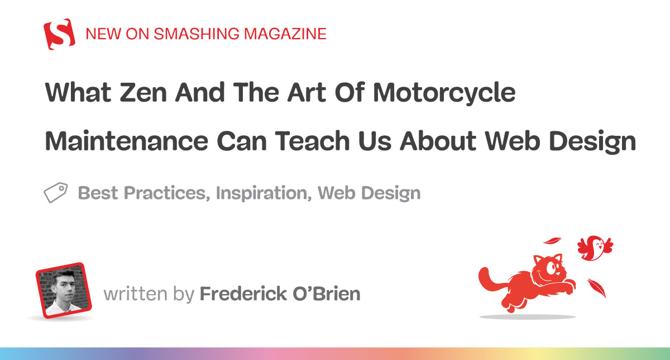Smashingmagazine
7d
399

Image Credit: Smashingmagazine
What Zen And The Art Of Motorcycle Maintenance Can Teach Us About Web Design
- Zen and the Art of Motorcycle Maintenance, a philosophical book by Robert M. Pirsig, offers insights applicable to web design by exploring the interplay between art, science, and self.
- The book emphasizes the harmony between technology and nature, cautioning against demonizing technology and stressing the responsibility of individuals in shaping technology's impact.
- Pirsig's reflections on arts vs. sciences, subjective vs. objective, and systems vs. people resonate in the digital age, highlighting the importance of navigating and building the web with mindfulness.
- The tension between classical and romantic perspectives in Zen correlates to the dichotomies faced in web design, like testing vs. intuition and structure vs. fluidity.
- Seeking Quality, where subjective and objective meet, is a core concept in both Pirsig's philosophy and web design, emphasizing the pursuit of excellence.
- Understanding how things work, reframing questions in terms of Quality, and bridging art with science are proposed strategies for fostering better web experiences.
- Creating harmonies between seemingly disparate worlds and allowing time for reflection and playfulness are also advocated to enhance web design practices.
- Quality, openness to learning, reframing metrics, and nurturing a spirit of play are key principles to elevate web design and engineering work towards excellence.
- The article suggests embracing the principles from Zen and the Art of Motorcycle Maintenance to bring a sense of harmony, quality, and delight to the digital realm.
- By integrating philosophy with web design practices, individuals can cultivate a deeper understanding of how to create meaningful, impactful experiences on the web.
Read Full Article
24 Likes
For uninterrupted reading, download the app